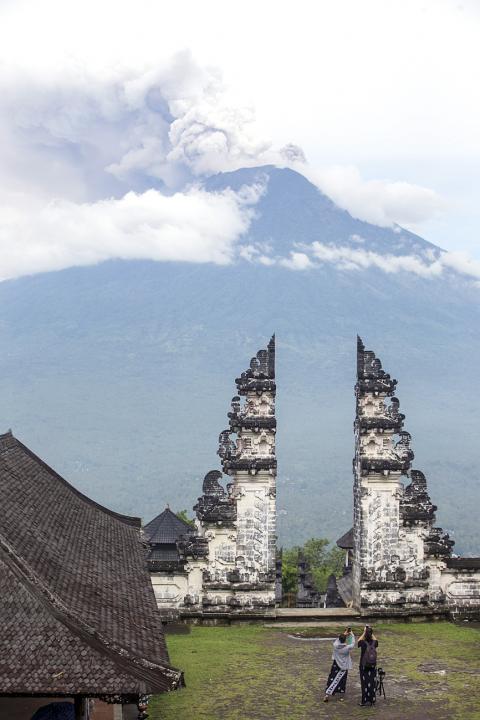Bali’s international airport yesterday opened for business after a nearly three-day shutdown, as towering columns of volcanic ash and smoke shifted direction on the Indonesian island.
The move raised hopes for some of the more than 120,000 tourists stranded after a surge in activity at Mount Agung had grounded hundreds of flights since Monday, sparking travel chaos and forcing the evacuation of villagers living in its shadow.
Airport officials cautioned that the airport could shut again if winds change direction once more and endanger flights.

Photo: EPA
Ash is dangerous for planes as it makes runways slippery and can be sucked into their engines.
“We are going to constantly monitor the situation on the ground,” Ngurah Rai airport spokesman Arie Ahsanurrohim said.
Domestic carrier Garuda said it would start flights to several cities across the vast archipelago nation yesterday evening, while AirAsia was set to fly to the Malaysian capital, Kuala Lumpur. All other international flights were on standby.
Australian tourist Ebra Syllivan was overjoyed at the prospect of getting back home.
“I didn’t know it was going to reopen today — we just came here because our flight was [originally scheduled for] tonight and we’ve booked out of our motel,” she said at the airport.
“It’s fabulous because we need to get back. We’ve got to get back to work,” she said.
Mount Agung could produce a major eruption at any moment, officials have said.
Tens of thousands have already fled their homes around the volcano — which last erupted in 1963, killing about 1,600 people.
As many as 100,000 will likely be forced to leave in case of a full eruption, disaster agency officials have said.
Experts said Agung’s recent activity matches the buildup to the earlier disaster, which ejected enough debris — about 1 billion tonnes — to lower global average temperatures by about 0.3oC for about a year.
“Small eruptions have been happening continuously, but there’s still the possibility of a bigger, explosive eruption,” said I Gede Suantika, a senior volcanologist at Indonesia’s Center for Volcanology and Geological Hazard Mitigation.
“Activity remains high and we are still on the highest alert level,” he said.
Roadside signs that read “Volcanic danger zone. No entry!” underscored the potential risks of staying behind.
There is a 10km exclusion zone around Agung, which is 75km from the beachside tourist hub of Kuta.
As of yesterday, about 440 flights had been canceled since the start of the week.

CHIP WAR: The new restrictions are expected to cut off China’s access to Taiwan’s technologies, materials and equipment essential to building AI semiconductors Taiwan has blacklisted Huawei Technologies Co (華為) and Semiconductor Manufacturing International Corp (SMIC, 中芯), dealing another major blow to the two companies spearheading China’s efforts to develop cutting-edge artificial intelligence (AI) chip technologies. The Ministry of Economic Affairs’ International Trade Administration has included Huawei, SMIC and several of their subsidiaries in an update of its so-called strategic high-tech commodities entity list, the latest version on its Web site showed on Saturday. It did not publicly announce the change. Other entities on the list include organizations such as the Taliban and al-Qaeda, as well as companies in China, Iran and elsewhere. Local companies need

CRITICISM: It is generally accepted that the Straits Forum is a CCP ‘united front’ platform, and anyone attending should maintain Taiwan’s dignity, the council said The Mainland Affairs Council (MAC) yesterday said it deeply regrets that former president Ma Ying-jeou (馬英九) echoed the Chinese Communist Party’s (CCP) “one China” principle and “united front” tactics by telling the Straits Forum that Taiwanese yearn for both sides of the Taiwan Strait to move toward “peace” and “integration.” The 17th annual Straits Forum yesterday opened in Xiamen, China, and while the Chinese Nationalist Party’s (KMT) local government heads were absent for the first time in 17 years, Ma attended the forum as “former KMT chairperson” and met with Chinese People’s Political Consultative Conference Chairman Wang Huning (王滬寧). Wang

CROSS-STRAIT: The MAC said it barred the Chinese officials from attending an event, because they failed to provide guarantees that Taiwan would be treated with respect The Mainland Affairs Council (MAC) on Friday night defended its decision to bar Chinese officials and tourism representatives from attending a tourism event in Taipei next month, citing the unsafe conditions for Taiwanese in China. The Taipei International Summer Travel Expo, organized by the Taiwan Tourism Exchange Association, is to run from July 18 to 21. China’s Taiwan Affairs Office spokeswoman Zhu Fenglian (朱鳳蓮) on Friday said that representatives from China’s travel industry were excluded from the expo. The Democratic Progressive Party government is obstructing cross-strait tourism exchange in a vain attempt to ignore the mainstream support for peaceful development

DEFENSE: The US would assist Taiwan in developing a new command and control system, and it would be based on the US-made Link-22, a senior official said The Ministry of National Defense is to propose a special budget to replace the military’s currently fielded command and control system, bolster defensive resilience and acquire more attack drones, a senior defense official said yesterday. The budget would be presented to the legislature in August, the source said on condition of anonymity. Taiwan’s decade-old Syun An (迅安, “Swift Security”) command and control system is a derivative of Lockheed Martin’s Link-16 developed under Washington’s auspices, they said. The Syun An system is difficult to operate, increasingly obsolete and has unresolved problems related to integrating disparate tactical data across the three branches of the military,